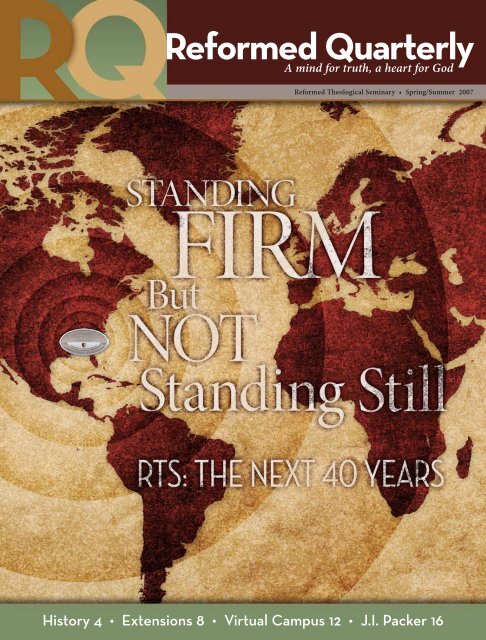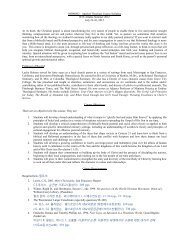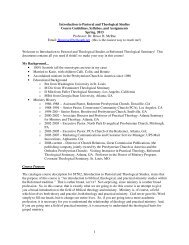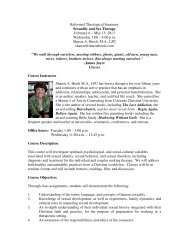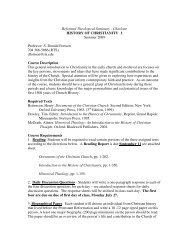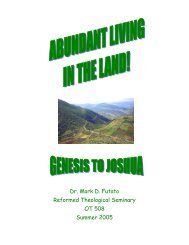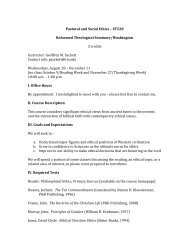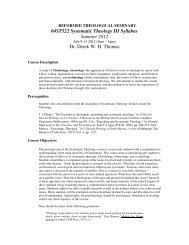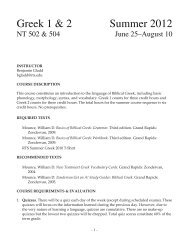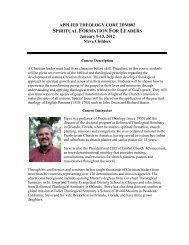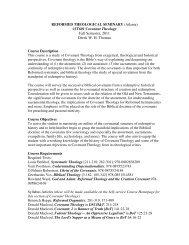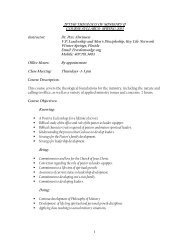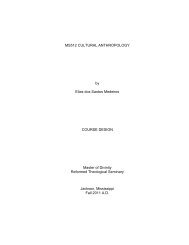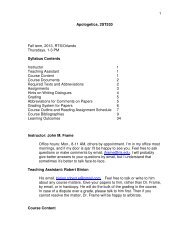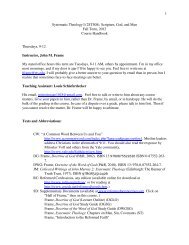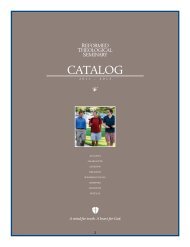Download - Reformed Theological Seminary
Download - Reformed Theological Seminary
Download - Reformed Theological Seminary
You also want an ePaper? Increase the reach of your titles
YUMPU automatically turns print PDFs into web optimized ePapers that Google loves.
<strong>Reformed</strong> Quarterly<br />
A mind for truth, a heart for God<br />
<strong>Reformed</strong> <strong>Theological</strong> <strong>Seminary</strong> • Spring/Summer 2007<br />
History 4 • Extensions 8 • Virtual Campus 12 • J.I. Packer 16
Chancellor’s Message<br />
Contents<br />
RTS AT WORK<br />
STANDING FIRM<br />
BUT NOT STANDING STILL<br />
by John R. Muether<br />
ATLANTA: Serving the<br />
Capital of the South<br />
THE VIRTUAL CAMPUS:<br />
How It Works<br />
ENTRUST TO THE<br />
FAITHFUL<br />
by J.I. Packer<br />
3<br />
4<br />
8<br />
12<br />
16<br />
During its first 40 years,<br />
<strong>Reformed</strong> <strong>Theological</strong><br />
<strong>Seminary</strong> has demonstrated<br />
a commitment<br />
to “standing firm but<br />
not standing still,” as<br />
well as cultivating “a mind for truth<br />
and a heart for God.” These mottos<br />
have expressed our vision for preparing<br />
ministers of the gospel in the timeless<br />
truths of God’s inerrant Word, powered<br />
by a passion for the <strong>Reformed</strong> faith.<br />
We in the RTS family seek to live<br />
out these principles in a variety of<br />
ways. This issue of <strong>Reformed</strong> Quarterly<br />
brings to a close our yearlong celebration<br />
of the 40th anniversary of RTS<br />
by highlighting some of the new ways<br />
in which our Lord has enabled us to<br />
make theological education “available,<br />
accessible and flexible.” Whereas previous<br />
issues in this series focused on<br />
the providential events in the foundation<br />
and expansion of RTS, this issue<br />
draws attention to the seminary’s role<br />
in equipping leaders for the church<br />
for the 21st century. In this sense you<br />
could describe this issue as an anticipatory<br />
celebration of our next 40 years<br />
(God willing) as much as a reflective<br />
celebration of our first 40 years.<br />
Whether through new locations,<br />
innovative curriculum advances, or<br />
cutting-edge technological tools, we<br />
always seek to enhance the theological<br />
and spiritual development of our<br />
students. By inculcating into the lives<br />
of future pastors a heart of grace and<br />
compassion for people, we work to<br />
help ministers of the gospel develop<br />
godly character while gaining a deeper<br />
Lyn Perez, Editor in Chief<br />
Paul Schwarz, Managing Editor<br />
Bill Henderson Design, Graphic Design<br />
Jolene Burgdorf, Sherry Lanier, Editorial Assistants<br />
Stephanie Hartley, Production Assistant<br />
<strong>Reformed</strong> Quarterly promotes RTS through articles designed to edify<br />
its readers through solid biblical instruction, and through reports that<br />
focus primarily on the national and global impact of RTS students,<br />
faculty and alumni. Our goal is that readers will become partners with<br />
RTS through prayer, financial giving, educational experience and student<br />
referral, as well as providing placement opportunities.<br />
knowledge of God’s Word. On that<br />
foundation, we build into students the<br />
practical skills of preaching and teaching<br />
effectively, as well as the capacity to<br />
address the multiple needs of building<br />
strong, healthy local churches.<br />
By God’s grace, our foundational<br />
vision for RTS will never change. The<br />
means of fulfilling that vision, though,<br />
will always change as necessary. That’s<br />
what we mean when we say we are<br />
“standing firm but not standing still,”<br />
embodying the principle of Semper<br />
Reformanda, or “Always Reforming.”<br />
As you may have noticed already<br />
from looking at the cover of this issue,<br />
RQ is reflecting this principle in a new<br />
way. We have redesigned the magazine<br />
to update our visual identity and mark a<br />
forward focus as we make our transition<br />
from a look back at our first 40 years to<br />
a look ahead to the years to come. The<br />
“old wineskins” served us well, but we<br />
trust that the new look will bring a fresh<br />
perspective on timeless principles.<br />
Today and tomorrow, as in 1966<br />
when RTS opened its doors, we need<br />
more than ever bright, able, committed<br />
and godly young students who can<br />
communicate well the Word of God<br />
and help their congregations effectively<br />
influence their communities — and<br />
their world — for Christ. We seek leaders<br />
with a mind for truth who always<br />
follow the inerrant Word of God as<br />
the only infallible rule of faith and<br />
practice, demonstrate a heart for God,<br />
grow in holy devotion, minister grace,<br />
and represent Christ in this world.<br />
May this characterize RTS until Christ<br />
returns. ◆<br />
The material in this magazine is copyrighted.<br />
For reprint permission, please call (407) 366-9493 or<br />
e-mail lperez@rts.edu.<br />
All Scripture references from the<br />
English Standard Version except where noted.<br />
Visit RQ online at www.rts.edu/quarterly.<br />
<strong>Reformed</strong> <strong>Theological</strong> <strong>Seminary</strong><br />
Atlanta • Boca Raton • Charlotte • Jackson<br />
Orlando • Virtual • Washington, D.C.<br />
1-800-543-2703 • rts@rts.edu • www.rts.edu<br />
2<br />
<strong>Reformed</strong> Quarterly
RTS at Work ...<br />
PUBLICATIONS<br />
• The First Forty Years, a history of RTS<br />
written by John Muether, associate professor<br />
of theological bibliography and research,<br />
was released in April. The book is available<br />
through the RTS online bookstore and at<br />
local campuses.<br />
• Dr. S. Donald Fortson III has edited the<br />
just-released book Colonial Presbyterianism.<br />
• Dr. John M. Frame has written nine articles<br />
for the New Dictionary of Christian Apologetics.<br />
“Divine Aseity and Apologetics” will appear in<br />
Revelation and Reason. “Is Natural Revelation<br />
Sufficient to Govern Culture?” will appear in<br />
Act3 Review.<br />
• Dr. Joel Harlow has an article, “Successfully<br />
Teaching the Biblical Languages Online at<br />
the <strong>Seminary</strong> Level: Guiding Principles of<br />
Course Design and Delivery,” in the current<br />
issue of Teaching Theology and Religion.<br />
• Dr. Charles E. Hill has published several<br />
articles recently, including “Millenarianism,”<br />
in Dictionary of Biblical Criticism and<br />
Interpretation; and “The Fourth Gospel in<br />
the Second Century: The Myth of Orthodox<br />
Johannophobia,” in Challenging Perspectives<br />
on the Gospel of John.<br />
• Dr. Derek Thomas has published two new<br />
books: Under the Apple Tree, on the Song<br />
of Solomon; and The Doctrine of the Church<br />
in the Twenty First Century.<br />
• Dr. Miles V. Van Pelt, along with Gary D.<br />
Pratico, released Charts of Biblical Hebrew<br />
in January. The second edition of Dr. Van<br />
Pelt’s Hebrew grammar, Basics of Biblical<br />
Hebrew: Grammar and Workbook, is<br />
scheduled for April release.<br />
TRAVELS<br />
• Dr. Steve Childers spoke on “How to Start<br />
and Strengthen a Regional Church Planting<br />
Network” at the Interdenominational National<br />
New Church Conference, Orlando, April 23-<br />
26. He will be a plenary speaker for national<br />
indigenous leaders at the West Africa Church<br />
Planting Institute Conference, co-sponsored<br />
by Ghana Evangelical Committee, GCA and<br />
MTW, in Ghana, June 18-22.<br />
• Dr. Rod Culbertson will teach a leadership<br />
training session, “Signs of a Healthy Church,”<br />
for Houston Lake Presbyterian Church,<br />
Warner Robins, Ga., May 18-21.<br />
In Memoriam: S. Elliot Belcher<br />
Mr. Belcher went home to be with the Lord on<br />
Dec. 14, 2006. He invested generously in RTS<br />
and served on the Board of Trustees for many<br />
years. RTS-Jackson was recently renamed the<br />
Belcher Campus in his honor.<br />
• Dr. S. Donald Fortson III provided<br />
commentary and mini-lectures for the<br />
Christian Heritage Tour of England, Scotland<br />
and France, March 23–April 2.<br />
• Dr. Mark Futato will give a public lecture<br />
in Bellingham, Wash., sponsored by Logos<br />
Bible Software, May 5.<br />
COMMENCEMENTS<br />
Charlotte<br />
Commencement:<br />
Saturday, May 26, 11<br />
a.m., Church at Charlotte, 2500 Carmel Road.<br />
Commencement speaker: Dr. Mark Ross.<br />
• Dr. Howard Griffith spoke to InterVarsity<br />
Christian Fellowship at Christopher Newport<br />
University, Newport News, Va., March 15, on<br />
“Give Glory to God: Clearing the Conscience.”<br />
• Dr. Charles Hill attended the spring meeting<br />
of the Covenant College board of trustees on<br />
March 15-16. He spoke at Emory University on<br />
March 23 at a doctoral seminar on the “History<br />
of Interpretation and Canon Development.”<br />
• Dr. Frank A. James III has traveled to a<br />
closed country in East Asia to teach Campus<br />
Crusade for Christ missionaries.<br />
• Dr. Simon Kistemaker will teach on<br />
Revelation at a <strong>Reformed</strong> seminary in<br />
Monterrey, Mexico, in June.<br />
ANNOUNCEMENTS<br />
• Dr. Miles V. Van Pelt has been appointed<br />
associate professor of Old Testament and<br />
academic dean at RTS-Jackson.<br />
• Dr. Howard Griffith has been appointed<br />
professor of systematic theology at RTS-<br />
Washington, D.C., becoming the campus’<br />
first full-time faculty member. He has taught<br />
systematic theology for RTS as an adjunct<br />
professor since 2001.<br />
• The 2007 Westminster Confession for<br />
Today Pre-PCA General Assembly<br />
Conference will take place June 11-12 at<br />
the Memphis Cook Convention Center.<br />
Speakers include J. Ligon Duncan, Sean<br />
Lucas, Doug Kelly, and Luder Whitlock<br />
(www.westminsterconfessiontoday.org).<br />
• Historical Tours of Christian Character<br />
2007. Dr. Harry Reeder will guide this tour<br />
exploring the character of numerous Civil<br />
War leaders while visiting historic sites in<br />
Virginia, Pennsylvania and Washington, D.C.<br />
Two tours are planned: Fredericksburg from<br />
July 10-13 and Gettysburg from Sept. 25-28.<br />
For more information, visit www.rts.edu/cct<br />
or contact Luther Bigby at ccc@rts.edu or<br />
(704) 688-4234.<br />
ONLINE<br />
Jackson Commencement:<br />
Friday, May 18, 7:30 p.m.,<br />
Trinity Presbyterian Church,<br />
Jackson. Commencement<br />
speaker: Dr. Frank Barker.<br />
RTS <strong>Reformed</strong> Quarterly Online:<br />
Share It With a Friend<br />
An online version of RTS <strong>Reformed</strong> Quarterly<br />
is now available. Visit http://www.rts.edu/site/<br />
resources/quarterly.aspx, click Resources, then<br />
click <strong>Reformed</strong> Quarterly and select the issue<br />
you want to view.<br />
• James L. Davis BuildingThe building<br />
that houses the library and classrooms at<br />
RTS-Orlando has been named the James<br />
L. Davis Building after a longtime friend<br />
and supporter of the seminary. On Nov. 15,<br />
2006, a special reception was held in his<br />
honor, and a portrait of Mr. Davis, painted by<br />
Esther Horvath, was placed in the lobby.<br />
• Dr. Rod Culbertson has been<br />
appointed Associate Professor of<br />
Practical Theology and Dean of Student<br />
Development at RTS-Charlotte and will<br />
teach Evangelism, Leadership and Pastoral<br />
Ministry, among other courses.<br />
• Mr. Johnny Mastry and Dr. Robert Penny<br />
have been appointed vice presidents for<br />
development for RTS-Orlando and RTS-<br />
Jackson, respectively.<br />
• RTS-Jackson alumnus Stephane<br />
Jeanrenaud has been appointed director<br />
of admissions and alumni relations for<br />
RTS-Charlotte.<br />
CAMPUS EVENTS<br />
• Preaching Conference at RTS-Charlotte<br />
“Preaching Truth in a Whatever World” is the<br />
theme of a one-day conference for pastors<br />
and church leaders on May 9 sponsored by<br />
Preaching magazine. Speakers will include Dr.<br />
Michael Duduit, Dr. R. Leslie Holmes, Dr.<br />
John Oliver and Dr. Jerry L. Cannon.<br />
Orlando Commencement:<br />
Friday, May 25, 7:30 p.m.,<br />
First Presbyterian Church,<br />
Orlando. Commencement<br />
speaker: Rev. Sandy Willson.<br />
sPRING/SUMMER 2007 3
4<br />
<strong>Reformed</strong> Quarterly
new ways to deliver theological training.<br />
In the 21st century, RTS remains true<br />
to its biblical basis while seeking<br />
senior management level, the Board announced that<br />
Cannada’s title would be changed to chancellor and<br />
chief executive officer, and that a president would be<br />
appointed for each of the three residential campuses.<br />
Having a president oversee each campus would allow<br />
for better response to the needs of students and<br />
churches in each region. Decentralization would<br />
yield stronger ties to local communities. Individual<br />
campus presidents appointed included Guy Richardson<br />
in Jackson, Frank James in Orlando and<br />
Frank Reich in Charlotte, along with Andrew Peterson,<br />
who became president of the Virtual Camby<br />
John R. Muether<br />
In September 2002, RTS inaugurated Robert<br />
C. “Ric” Cannada Jr. as its third president.<br />
The son of founding Board member Robert<br />
Cannada, as well as an RTS alumnus, the<br />
vice president of the Charlotte campus was<br />
well suited for this calling. The younger<br />
Cannada conducted his RTS doctoral research<br />
on nontraditional course scheduling<br />
in theological education.<br />
Soon after his inauguration, the seminary determined<br />
that further institutional restructuring was<br />
beneficial, because one individual could not oversee<br />
an institution that had grown to the size that RTS had<br />
become. In 2003, in a complete reorganization at the<br />
Continued on Page 6
Atlanta<br />
Boca Raton<br />
The first RTS extension campus was established in Washington, D.C., in 1993.<br />
An extension in Boca Raton followed in 1998, with RTS-Atlanta being launched in 2000.<br />
The roots of the Virtual Campus took hold in 1996 with the hiring of Andrew Peterson,<br />
now the president of RTS-Virtual.<br />
Continued from Page 5<br />
pus. Equally significant was the expansion of the Executive<br />
Committee, for the first time including representatives from<br />
Florida and North Carolina.<br />
As Cannada stepped into the shoes of his predecessor,<br />
Luder Whitlock, he posed the question, “What can RTS do<br />
in the next generation?” He focused attention on Atlanta<br />
and Washington, D.C., hopeful of converting those two sites<br />
into full campuses. Cannada was eager to outfit the capital<br />
of the nation and the “capital of the South” with core faculty<br />
in theology and biblical studies, with local pastors serving<br />
as adjunct professors in practical theology. RTS launched an<br />
ambitious $75 million financial campaign to expand these<br />
two sites as well as provide greater financial stability by significantly<br />
enlarging the endowment fund.<br />
The story of RTS in Atlanta and Washington, D.C. (and<br />
Boca Raton, Fla., and additional metropolitan areas) is still<br />
unfolding. What is clear is that Cannada’s vision for the<br />
school signals that the seminary’s restructuring would involve<br />
no retreat from its mission.<br />
South Korea<br />
“Accessible, Available and Flexible”<br />
A spirit of innovation expanded RTS beyond additional<br />
campuses and into cyberspace. In 1988, Richard Watson<br />
created a summer Master of Arts program that enabled students<br />
to earn a degree by enrolling in a series of one-week<br />
courses over the span of four summers. Included in the program<br />
were 18 hours of audiotape courses produced by the Institute<br />
for <strong>Theological</strong> Studies in Grand Rapids, Michigan.<br />
The opening of the Orlando campus confirmed student<br />
interest in flexible education (block scheduling of classes<br />
proved popular), and the summer program expanded into<br />
a summer-winter program with the addition of January<br />
courses. In addition to ITS courses on tape, RTS established<br />
a department of distance education. The first taped products<br />
were by guest faculty, including J.I. Packer’s course on<br />
English Puritan theology. These courses proved very popular<br />
for resident students, who could simply listen to the<br />
tapes or register for a course for credit.<br />
In 1996, RTS hired Andrew Peterson as vice president for<br />
distance education. Under his leadership the distance education<br />
program evolved into the “Virtual Campus.” Taped<br />
lectures accompanied by syllabi with reading and written<br />
assignments eventually gave way to genuine online learning<br />
employing state-of-the-art educational technology.<br />
Soon the Association of <strong>Theological</strong> Schools granted RTS<br />
permission to test a pilot program for a virtual degree (in<br />
which up to 90 percent of the degree could be obtained at<br />
a distance). In February 2004 the ATS awarded the school<br />
ongoing approval for its Master of Arts in Religion degree<br />
through the Virtual Campus (see page 12).<br />
The Virtual Campus accommodates the “lifelong learner”<br />
Scotland
Washington<br />
D.C.<br />
by allowing students to stay in their present church contexts<br />
and receive a seminary education without moving to a campus.<br />
On-site mentoring under direct pastoral supervision<br />
rendered learning as more than mere information transfer.<br />
“A network of millions of computers,” Peterson observed,<br />
“provides an exciting educational technology to train leaders<br />
for His church, filling the earth ‘with the knowledge of<br />
the glory of God, as the waters cover the sea.’” By 2006 the<br />
Virtual Campus had over 500 students, coming from as far<br />
away as Afghanistan, Belarus, China and Malawi.<br />
Looking Ahead<br />
Virtual<br />
At the dedication of the Orlando campus in January 1999,<br />
then-president Luder Whitlock reflected on the history of<br />
RTS with his characteristic understatement. “Through all<br />
these years,” he observed, “the Lord has been faithful and<br />
has blessed us far more than we had reason to expect.”<br />
In the wider context of the growth of American evangelicalism<br />
and its institutions in the latter half of the 20th<br />
century, the RTS story may at first seem unremarkable. After<br />
all, other evangelical seminaries have expanded and developed<br />
satellite campuses. And no doubt RTS’ location in<br />
the Southeast provided it a demographic advantage, as that<br />
quadrant of the country has particularly experienced population<br />
growth and an economic boom. Still, no school can<br />
claim such remarkable growth as RTS from it inauspicious<br />
beginnings in 1966.<br />
None of this was possible without the sacrificial gifts of<br />
the friends of the seminary. All investments in the work of<br />
RTS, large and small, from individuals, churches and foundations,<br />
have been gratefully received and have enabled the<br />
seminary to grow.<br />
Statistically, the story of the seminary is staggering. After<br />
40 years of fervent prayer and generous giving by countless<br />
lay people, farsighted vision and imaginative thinking by the<br />
Board, and faithful and diligent service by the faculty, RTS<br />
has become one of the 10 largest seminaries in North America.<br />
By 2006 the seminary had over 7,000 alumni in 46 states<br />
and 43 foreign countries. On its three campuses and exten-<br />
Continued on Page 19<br />
RTS’ international partnerships include formal associations with institutions in South<br />
Korea, Scotland and Brazil, with additional works in progress in places such as Russia.<br />
Russia<br />
Brazil<br />
sPRING/SUMMER 2007 7
Serving the CapI<br />
Dan Rogers<br />
CATHY BURWELL<br />
lightimageinc.com<br />
8<br />
<strong>Reformed</strong> Quarterly<br />
EARL WILLIAMS
t a l o f t h e S o u t h<br />
Students at RTS-Atlanta influence<br />
their communities and region<br />
for Christ while taking classes.<br />
Atlanta has long been called “The Capital of<br />
the South.” Coca-Cola and CNN are famously<br />
headquartered there, and the metropolitan<br />
area is the largest south of the Mason-Dixon<br />
Line and east of the Mississippi. Remarkably,<br />
until 2000, the Atlanta area did not contain a<br />
single fully accredited evangelical seminary<br />
in the <strong>Reformed</strong> tradition. The establishment<br />
of the RTS-Atlanta extension campus<br />
changed that.<br />
Classes are now available in biblical studies,<br />
theological studies, church history, apologetics and practical<br />
theology as part of a Master of Arts in Religion offering.<br />
In an effort to expand RTS-Atlanta’s offerings, the RTS<br />
Board of Trustees has approved the fully funded addition of<br />
one faculty member and is securing funding for two more<br />
faculty members.<br />
A distinctive feature of RTS’ approach to extensions is that<br />
while traditional extensions are seen as feeders to the main<br />
campus, RTS sees theirs as self-contained units intended to<br />
bring an indigenous gospel ministry presence to that region.<br />
As such, RTS-Atlanta students are firmly rooted in the area<br />
in which they live.<br />
Three of these students illustrate a rough cross-section<br />
of the ministries and community connections represented<br />
by the RTS-Atlanta constituency. Whether pastors, church<br />
planters, disciplers or something else, they share a common<br />
bond in gospel service and the greater Atlanta area.<br />
Dan<br />
Rogers<br />
Church<br />
Planter,<br />
Athens, Ga.<br />
Once upon a time he performed “between<br />
the hedges” at the distinctly landscaped<br />
Sanford Stadium as a football player at the<br />
University of Georgia. Today, Dan Rogers<br />
operates in a different kind of planting —<br />
that is, a church-planting effort initiated by<br />
Redeemer Presbyterian Church in Athens.<br />
The South Carolina native returned to Athens with his family<br />
in 2002 after several years in Colorado as a regional director<br />
with the sports ministry Athletes in Action.<br />
After graduating from UGA in 1993, Dan had stayed in<br />
Athens ministering to UGA athletes through AIA, so his<br />
return to Georgia was a return to his deepest roots. When<br />
he sensed a calling to leave AIA to go to seminary and enter<br />
into pastoral ministry, he originally planned to attend RTS-<br />
Orlando, having taken some classes there over the years.<br />
However, his friend and spiritual mentor Hal Farnsworth,<br />
senior pastor at Redeemer, “suckered me into coming here,”<br />
Dan says, laughing. “Hal’s the guy who said, ‘You need to<br />
become a pastor,’ and for some reason I believed him!”<br />
The two main attractions for Dan were the opportunity<br />
to be mentored by Hal as well as to study at RTS-Atlanta.<br />
Along with those came the chance to help plant another<br />
church, located about 35 miles from Athens in the northern<br />
suburbs of Atlanta. “I’m a church planter at heart,” explains<br />
Dan, who helped plant St. Patrick’s Presbyterian Church in<br />
Greeley, Colo., during his time in the Rockies. “I love unchurched<br />
people.” As such, in his current church-planting<br />
effort, Dan leads two small groups, of which one is mostly<br />
comprised of people who have no prior church background<br />
(the other is a core group of Redeemer members).<br />
Logistical issues threaten the future of the current plant,<br />
but Dan is no stranger to uncertain futures. In fact, they are<br />
a central element of his journey to faith. Twice during his<br />
Continued on Page 10<br />
sPRING/SUMMER 2007 9
Dan met Michelle while playing football at the University of Georgia.<br />
Continued from Page 9<br />
UGa football career, Dan was forced to miss entire seasons<br />
— the first due to injuries to both shoulders, the second due<br />
to an injury to the opposite knee from the one he’d blown<br />
out the previous year. Not only did Dan persevere and return<br />
to the field in both instances, but he also credits the experiences<br />
with driving him to God. “I had nowhere else to go,”<br />
Dan says. “God did His work.”<br />
Dan’s work at RTS-Atlanta is about a year away from completion.<br />
He, his wife, Michelle, and their five children (ages<br />
11 down to 2) are currently wedged into a 1,200-square-foot<br />
house as they seek to identify God’s post-RTS plan for them.<br />
Wherever that leads them, Dan looks forward to greater opportunities<br />
to apply the lessons he’s learned both at RTS and<br />
in the circumstances of life.<br />
of the training involved her teaching a 10-week overview of<br />
systematic theology. Cathy would then meet with the leaders<br />
throughout the year either over lunch, coffee or the phone<br />
to give the leaders advice on how to deal with issues in their<br />
groups.<br />
“Now that I’m not on staff anymore, I guess I’m just a very<br />
involved volunteer,” Cathy says. Even while caring for her<br />
newborn, she continues to meet with a group of young married<br />
women whom she’d discipled already. Many of them are<br />
brand-new Christians, as well as one who Cathy suspects is<br />
yet to be converted. “They’re so young, they’re so hungry, and<br />
they’re fun, so I’m hoping to keep leading them,” she says.<br />
As for the ministry to strippers, Cathy cherishes the experience.<br />
“I love to share my faith, so I offered to help with<br />
it,” Cathy explains. “I thought it was something everybody<br />
would want to do, but it’s not!” Every four to six weeks,<br />
Cathy and other women would arrange to go into the clubs<br />
and give the dancers gift baskets made by church members<br />
and filled with items such as chocolate, lotion and perfume.<br />
The women would also receive a brochure containing a hotline<br />
number to call in case they ever wanted help getting out<br />
of the lifestyle.<br />
According to Cathy, club managers welcomed them as a<br />
means of dealing with the high percentage of dancers with<br />
drug problems. “And the women were always so receptive,”<br />
she recalls, “because they were working constantly in an environment<br />
where they were being used and abused.” Cathy<br />
recently looked on as one of the former dancers was baptized<br />
at Perimeter along with her two preteen daughters.<br />
Even before being prompted by motherhood to step away<br />
from that ministry, Cathy has always taken the slow road<br />
toward her RTS-Atlanta degree. She’s been taking one class<br />
Cathy gave birth to baby Cate in January.<br />
CATHY<br />
BURWELL<br />
Discipleship<br />
Trainer,<br />
Duluth, Ga.<br />
It’s an understatement to say that Cathy<br />
Burwell has worked with a wide variety of<br />
trainees in her years of ministry. She and her<br />
husband, Troy, have one, named Cate, who’s<br />
just three months old. Besides being a new<br />
mom, Cathy has also worked with college<br />
students, single adults, young married women<br />
and strippers. That last constituency was as part of an outreach<br />
to the underside of Atlanta’s nightlife led by a friend of<br />
Cathy who was rescued from that lifestyle by Christ about 20<br />
years ago.<br />
Before motherhood, Cathy’s principal day job was as associate<br />
director of women’s discipleship at Perimeter Church,<br />
the prominent Atlanta-area congregation founded by RTS<br />
alumnus Randy Pope. In that role, Cathy trained women<br />
who would be first-time leaders of home-based discipleship<br />
groups that would meet throughout the following year. Part<br />
10<br />
<strong>Reformed</strong> Quarterly
at a time since 2000, lacking only “three or four classes” by<br />
her inexact count. Her seminary experience has especially<br />
helped her teach theology to the discipleship trainees.<br />
“I would not have had a clue how to teach a lot of that stuff<br />
without the training from the seminary,” Cathy says. “And<br />
it’s such a treat to have a class where a woman is teaching<br />
women. We can talk about theology in light of being women<br />
and ministering to women. For example, in one of our classes<br />
we talk about helping women who have had abortions.”<br />
EARL<br />
WILLIAMS<br />
Pastor,<br />
Lilburn, Ga.<br />
Countless are the stories of those who encountered<br />
salvation after hearing the preaching<br />
of a pastor. Rarer are those of a pastor<br />
encountering salvation after realizing that<br />
he’d been preaching heresy for nearly 15<br />
years, which is the story of Earl Williams.<br />
The current pastor of Christ Church of<br />
Grace in suburban Atlanta has been in pastoral ministry since<br />
1972. For more than 20 of those years he served in a church<br />
denomination he publically identifies only as having been<br />
outside the realm of orthodoxy. Earl had risen through the<br />
ranks of that family of churches to a position of prominence<br />
writing magazine articles and speaking at conferences.<br />
Upon Earl’s arrival in the Atlanta area from New York in<br />
1988 to take on a new pastorate, “God brought me to a crisis,”<br />
he recalls. “He showed me, This church is your life, not Me.’”<br />
After Earl discovered the writings of theologians such as R.C.<br />
Sproul and John Piper, “He converted me,” he confesses. “We<br />
taught Christ, but it was Christ plus the law, or Christ plus<br />
whatever. Through breaking my dependence on the organization,<br />
He showed me that it’s Him alone I needed to trust.<br />
Earl began to preach and write in reflection of his new understanding<br />
of grace through faith alone, causing friction<br />
within the denomination that ignited a firestorm that forced<br />
him to leave in 1995. That’s when Earl began planting Christ<br />
Church of Grace. The church is located in a racially and ethnically<br />
mixed community, with a vision for ministering to<br />
people of all racial and ethnic backgrounds. Its mission, according<br />
to Earl, is “to live and teach God’s sovereign love<br />
and grace.”<br />
He began studying at RTS-Atlanta in 2004 after searching<br />
for a seminary in the area that reflected the understanding<br />
of the doctrines of graces that he’d developed through his<br />
own reading. Earl’s experience at RTS has included supplementing<br />
his Atlanta education with Virtual Campus classes<br />
to help speed things along. His wife has sat in on classes with<br />
him whenever the opportunity has been available, and has<br />
listened in on the Virtual lectures with him.<br />
One practical benefit of the RTS experience has been in<br />
teaching catechism classes at the church. “It really helps [my<br />
wife to] disseminate these truths to the young people,” Earl<br />
says. “The seminary training has helped her not only to learn<br />
Earl and his family moved to the Atlanta area from New York City in the late 1980s.<br />
the confessional teachings but also to deeply understand<br />
them and articulate them to the children.”<br />
Earl’s experience has grounded him in the ongoing effort<br />
to make the gospel practical in every aspect of life. “God’s<br />
grace is not just a theological construct, but it is a structure<br />
for your life,” he explains. “It is Christ living in you. God’s<br />
sovereign grace makes everything in your life, whether you<br />
understand it or not, fit together.” ◆<br />
To Our Nation’s Capital and Beyond<br />
Atlanta is not alone as an RTS extension site. In fact,<br />
RTS-Washington, D.C. and RTS-Boca Raton both<br />
predate the Atlanta campus. The D.C. campus was<br />
established in 1993, with the Boca Raton extension<br />
launched in 1998.<br />
The appointment of Dr. Howard Griffith as professor<br />
of systematic theology at RTS-Washington, D.C.<br />
(see page 3) is part of an effort to expand the ministry there<br />
in a similar manner as is being done in Atlanta. Funding<br />
is being secured for two additional full-time faculty members.<br />
The campus is currently located at McLean Presbyterian<br />
Church inside the Beltway in northern Virginia.<br />
RTS-Boca Raton was established in partnership with<br />
Spanish River Church. Dr. Buz McNutt, executive director<br />
of the Boca Raton campus, is part of the pastoral staff at<br />
Spanish River. Like Atlanta and Washington, D.C., RTS-<br />
Boca Raton offers a Master of Arts in Religion program.<br />
Extension sites have been experimented with and are<br />
under consideration for additional metropolitan areas.<br />
For more information on RTS extensions, visit www.rts.<br />
edu and click on the Campuses Near You link. ◆<br />
sPRING/SUMMER 2007 11
VTHE<br />
Virtual Campus leaders, guided by Dr. Andrew Peterson, RTS-Virtual<br />
president (dark shirt), meet to discuss the development of new course<br />
offerings.<br />
IRTUAL<br />
Scripture reminds us that there’s nothing new under the sun, and as such, the concept of<br />
distance education is hardly a 21st-century phenomenon. Correspondence courses have<br />
existed in various formats and educational disciplines for as long as anyone can remember.<br />
The RTS Virtual Campus distinguishes itself from other<br />
distance education efforts through the extent to<br />
which RTS-Virtual students can complete their degree<br />
requirements without ever leaving home. Students who are<br />
part of the Virtual Campus may complete up to 90 percent<br />
of their coursework for a Master of Arts in Religion degree<br />
from a distance, with the only on-location requirements being<br />
two on-campus seminars, one at the beginning of the<br />
program and another at the end. This M.A.R. program is<br />
the only such one currently accredited by the Association of<br />
<strong>Theological</strong> Schools in the United States and Canada, as well<br />
as by the Commission on Colleges of the Southern Association<br />
of Colleges and Schools.<br />
“Technology is not going to replace the traditional training<br />
of residential education,” says Lyn Perez, who has served<br />
in various leadership roles with RTS and helped establish<br />
RTS-Virtual. “The Virtual Campus serves those who wish to<br />
be better prepared biblically and theologically for ministry<br />
to get the preparation they need where they are when they<br />
cannot uproot and move for residential education.”<br />
The RTS-Virtual experience contains many components distinguishing<br />
it from that of a residential or extension campus:<br />
Admissions Process<br />
In order to receive credit for distance courses at RTS, students<br />
must be officially admitted to the seminary. The RTS-<br />
Virtual application process now takes place completely online.<br />
On-Campus Seminars<br />
All M.A.R. students through the Virtual Campus are required<br />
to complete two seminars at an RTS residential campus.<br />
Students attend a three-day orientation seminar at the<br />
beginning of their degree work, followed by an integration<br />
seminar at the end of the program. Both seminars involve<br />
lectures, academic advising, theological research, and networking<br />
with other M.A.R. students.<br />
How it<br />
12<br />
<strong>Reformed</strong> Quarterly
CAMPUS<br />
by Paul Schwarz<br />
Recorded Lectures<br />
Many Virtual Campus courses consist of recorded lectures<br />
(MP3 files on CD), study helps, and a detailed syllabus<br />
specifying reading and written assignments. Students mail<br />
or e-mail assignments to the RTS-Virtual office, and examinations<br />
are administered by a proctor.<br />
As a reflection of technological changes, as well as an ongoing<br />
commitment to stay on the leading edge of that technology,<br />
lectures are now available through the iTunesU program<br />
(see “RTS on Your iPod” sidebar). At the same time,<br />
the cassette tapes the marked the original delivery of RTS-<br />
Virtual course lectures are being phased out. Tapes will no<br />
longer be sold after May 31, and registration of materials in<br />
that format will end on September 1.<br />
The changing face of technology is also affecting how the<br />
exams are administered. Starting in June, RTS-Virtual exams<br />
will be distributed exclusively by e-mail, with postal delivery<br />
being completely phased out.<br />
Works<br />
sPRING/SUMMER<br />
Online Coursework<br />
In early 1999, Greek I was the first online course offered<br />
by RTS-Virtual. Today, Greek II, Hebrew I and Hebrew II<br />
are also offered online.<br />
For an additional fee, many RTS-Virtual students use<br />
CENTRA Web conferencing software to access the classes.<br />
Through CENTRA, students use their Internet browser to<br />
experience two-way audio and video. Whether in a session<br />
with the Greek or Hebrew instructor, or in participating in<br />
a webcast from an RTS residential class, students can “attend”<br />
live, streaming lectures during which they can interact<br />
with the professor and other students in real time — including<br />
asking the professor questions as if they were physically<br />
sitting in the classroom.<br />
All CENTRA sessions are archived and can be viewed as<br />
many times as the student wishes. Staff members at RTS-<br />
Virtual provide technical support for students, not only to<br />
troubleshoot problems but also to help even the most technologically<br />
disinclined to feel comfortable with the format.<br />
Church-Based Mentoring<br />
Mentoring is a distinct feature of the RTS-Virtual program,<br />
designed to help students attain a greater balance of growth<br />
during their course of study. In fact, the mentoring component<br />
helped encourage accreditors to approve the program.<br />
Continued on Page 15<br />
sPRING/SUMMER 2007 13
A Virtual Vision<br />
by Dr. Andrew Peterson<br />
Did you know that often the apostle Paul was a distance<br />
educator? In addition to ministering in person, by<br />
God’s grace he wrote epistles, which taught the faith,<br />
expressed his love and encouraged hope among the brethren.<br />
His preparation<br />
of mind and heart<br />
for church ministers<br />
and lay persons<br />
included using the<br />
parchment media<br />
of the times to communicate<br />
the eternal<br />
biblical teaching<br />
to a particular audience<br />
in a specific<br />
era and throughout<br />
different geographic<br />
locations. The<br />
church grew daily,<br />
increasing from Jerusalem<br />
throughout<br />
the Roman Empire<br />
and beyond.<br />
In much the same<br />
way, the theological<br />
seminary in the 21st<br />
century faces the<br />
awesome challenge<br />
of re-presenting the<br />
Bible’s teaching to<br />
a new, postmodern<br />
generation in a rapidly<br />
changing cultural<br />
and technological world. Computer networking for the<br />
Virtual Campus is one innovation for assisting the church in<br />
accomplishing the task of equipping its leaders and promoting<br />
lifelong learning from biblical study. With this “distance<br />
education,” most of the formal instruction occurs with the<br />
teacher and the learner in separate locations with support<br />
from a local mentor.<br />
As clergy and laypeople employ the new educational technology<br />
with CDs and the Internet, a productive synergy of<br />
intellectual resources in applied situations results. Professors<br />
who turned from typewriters to word processors at their<br />
own expense a decade ago are now discovering the Internet<br />
as a new worldwide reference and presentation tool for their<br />
teaching. Such communication devices can bring them closer<br />
to more students in more churches.<br />
What characterizes today’s seminary student? Seminaries<br />
have been attracting more older students with families.<br />
Rather than just another type of graduate school to follow the<br />
undergraduate years, the seminary is a professional training<br />
facility for a more mature individual who immediately will<br />
assume leadership in the church.<br />
Similar to other turning points in history, a new communications<br />
medium is changing the world. When Gutenberg<br />
perfected movable type, he provided a tool for the Age of<br />
Reformation. In God’s providence, computer-based digitized<br />
print and images are here to help us with the teaching/<br />
learning enterprise for a much-needed New Reformation in<br />
our church and society. Networking 50 million computers in<br />
the world has made possible multimedia communication, including<br />
computer-based training, anywhere and any time.<br />
The communication revolution brings new ways for faculty<br />
to train students to think theologically. Distance education<br />
has arrived to service the new faculty and student<br />
relationship in the technological world of our time. Rather<br />
than replacing personal discipleship for leadership, new<br />
electronic tools are now available that enhance older helps<br />
such as books, journals and newsletters. In fact, the tools are<br />
so “smart” that they allow some new students to stay in their<br />
present church and community context and receive their<br />
education without moving to a campus. The mentoring, the<br />
crucial personal dimension of pastoral training, is done on<br />
site at the church supplemented by the great resources of the<br />
seminary from a distance.<br />
Our <strong>Reformed</strong> message, without idolizing human reason,<br />
provides the objectivity missing from postmodern thinking<br />
as well as the community found in good family and church<br />
life. This is taught at a number of fine residential seminaries,<br />
and the Virtual Campus will be an additional way to extend<br />
the teaching to even more students throughout the world. A<br />
network of millions of computers provides exciting technology<br />
to train leaders for His church, filling the earth “with the<br />
knowledge of the glory of the Lord, as the waters cover the<br />
sea” (Habakkuk 2:14). ◆<br />
Excerpted from an article by Dr. Andrew Peterson, president<br />
of RTS-Virtual, originally published in the Fall 1998 issue<br />
of <strong>Reformed</strong> Quarterly.<br />
14<br />
<strong>Reformed</strong> Quarterly
Alice Hathaway—Virtual Campus Registrar<br />
Continued from Page 13<br />
All RTS-Virtual students are required to choose a mentor<br />
early in their degree work. Students meet with their mentors<br />
to review course material and discuss its application to<br />
personal growth and ministry. The mentor may be a pastor,<br />
elder or other qualified lay person in the church.<br />
Mentors discuss lectures with students, may serve as proctors<br />
for exams, read theses and help evaluate the progress of<br />
the students throughout the coursework. They are invited to<br />
attend the on-campus seminars at RTS to gain a fuller picture<br />
of the scope of the program.<br />
RTS-Virtual provides mentors with materials and resources<br />
for effective mentoring, including schedules and guides for<br />
working through each course with the student. Students meet<br />
with their mentor at least four times during the time of study in<br />
each course to assess progress, deal with problems, share challenges<br />
and prayer requests, and address other pertinent issues.<br />
Certificate Programs<br />
The Virtual Campus also offers several certificate programs.<br />
Students may earn a certificate in one of six areas:<br />
biblical studies, disability ministry, general studies, historical<br />
studies, missions and theological studies. The certificate<br />
program provides an opportunity for students to take seminary<br />
classes without completing a degree.<br />
Full Campus Status<br />
Dr. Andrew Peterson is the president of RTS-Virtual.<br />
Since the three RTS residential campuses (Jackson, Orlando<br />
and Charlotte) also have presidents, this means that under<br />
the seminary’s current structure, distance education is emphasized<br />
similarly to traditional residential education. This,<br />
along with recent developments concerning the RTS extension<br />
campuses (see “To Our Nation’s Capital and Beyond” on<br />
page 11), emphasizes RTS’ commitment to working toward<br />
making theological education increasingly available, accessible<br />
and flexible. ◆<br />
RTS on<br />
Your iPod<br />
An increasingly common question in celebrity Q&A<br />
features in various publications is “What’s on your<br />
iPod?” Even President Bush periodically reveals his<br />
latest downloads onto the wildly popular digital audio<br />
player. While most people use their iPods to listen to music,<br />
covering everything from Mozart to Metallica, a new<br />
offering enables students at the Virtual Campus to use the<br />
technology to listen to lectures by RTS professors.<br />
Through the iTunesU software, RTS-Virtual students<br />
can access course materials and download them onto<br />
their computer or onto an MP3 player such as an iPod.<br />
When this article went to print, the latest addition to the<br />
RTS iTunesU library was an entire set of “History of Missions”<br />
lectures by Dr. Sam Larsen, professor of missions<br />
at RTS-Jackson. The online library also contains audio<br />
archives of RTS chapel services and other non-course resources.<br />
To learn more about how to access Virtual Campus<br />
resources and other RTS-related items on iTunesU, visit<br />
itunes.rts.edu.<br />
sPRING/SUMMER 2007 15
16<br />
<strong>Reformed</strong> Quarterly
J.I. Packer, the esteemed professor at Regent College in Vancouver, British Columbia, gave<br />
a 15-minute message at a dinner this past November at RT S–Orlando celebrating the 40 th<br />
anniversary of RT S. This article represents an edited transcript of the entire message.<br />
My public identity is of a Bible man, a gospel<br />
man, a <strong>Reformed</strong> man, and a Puritan man. I<br />
seek to maintain this identity because I find<br />
this to be the finest identity a Christian man<br />
can aspire to. It has within itself the resources<br />
for maturity and wisdom and enterprise<br />
for God in the next 40 years, both for RTS alumni and<br />
the institution itself.<br />
By God’s grace I have a heart that has been claimed by<br />
our Lord Jesus Christ, and like Paul, I know what it is to live<br />
by faith in the Son of God, who loved me and gave Himself<br />
for me. That, by the way, is where one learns the reality of<br />
particular redemption — one of the great truths for which<br />
RTS has always stood. He loved me and gave Himself for<br />
me, as for each other single Christian in this world.<br />
I have a burdened heart for the church these days. In<br />
the older churches there is so much to cause distress. I<br />
speak as an Anglican, and perhaps need to say no more<br />
than to declare that fact. But the other side of the matter<br />
is that in other parts of the world, God is doing wonderful<br />
things — expanding the church in numbers and<br />
giving the church a quality of life that has a cutting edge<br />
and makes a difference in local communities. So it’s a<br />
little like the beginning of Dickens’ A Tale of Two Cities:<br />
These are the best of times as well as the worst of times.<br />
The next 40 years are going to be like that, I think, for<br />
all of us. But by the grace of God, knowing and seeing<br />
the works of God as His Word is faithfully proclaimed,<br />
we shall find resources for courage, for service and —<br />
where necessary — for combat with error and folly that<br />
Continued on Page 18<br />
sPRING/SUMMER 2007 17
Continued from Page 17<br />
seek to ruin our civilization, our culture and our souls.<br />
Within this frame of commitment to Christ and to the<br />
church, I would like to tell you what I call myself these days.<br />
It’s only recently that I’ve begun to use this word to describe<br />
myself, but I think it’s the word that fits. I have been called<br />
a theologian and a pastor, and I hope in some measure that<br />
I merit those two descriptions. But nowadays I call myself<br />
a “catechist” — someone who gives his life to teaching the<br />
Lord’s people the truths that we live by.<br />
Some professional theological scholars engage in disputes<br />
with their peers that, however fascinating, have little or nothing<br />
to do with the truths that people live by. As I get older, more<br />
and more I find that these truths are those upon which I want<br />
to concentrate for the rest of my life and ministry. I have written<br />
books that seem to me are, I shall use the technical term,<br />
Finally, I give you a thought about the products of responsible<br />
teaching. These are the faithful men at the receiving end<br />
of sober and sound instruction, who will hold fast to what<br />
they’re taught, and pass it on, becoming teachers of the next<br />
generation after them in the churches where they serve. Part<br />
of the task of being a pastor is to be a trainer and equipper<br />
of folk in one’s own congregation who will, within their own<br />
narrower frame of reference, be doing the things they are doing<br />
as a teacher, spiritual leader and counselor, enabling folk<br />
to keep a clear conscience in their obedience to God.<br />
We have never yet, I believe, made as much as we need to<br />
make of the talents of those God brings into our churches as<br />
humble believers. For evangelical congregations everywhere,<br />
I think it remains true that there is more to be done. Welleducated<br />
folk in our congregations will have gifts of teaching<br />
It may be that the pressure against us evangelicals will increase over the next generation.<br />
“catechatechistic” books, spelling out the truths that Christians<br />
live by. So if God spares me, there are more in the works.<br />
This is what I see more clearly my life is meant to be about.<br />
I have ringing in my mental ears Paul’s words to Timothy:<br />
“You, then, my child, be strengthened by the grace that is<br />
in Christ Jesus. And what you have heard from me in the<br />
presence of may witnesses, entrust to faithful men who will<br />
be able to teach others also” (2 Timothy 2:2, New American<br />
Standard Bible). We see two things there. First, be strengthened<br />
in the grace of our Lord Jesus, that there may always be<br />
clarity, courage and compelling power in the ministry you<br />
fulfill. Also, transmit God’s truth as Paul has taught it to you<br />
— transmit it to faithful folk who themselves will guard it,<br />
keep it intact and be able themselves to transmit it intact to<br />
the next generation of teachers who come after them.<br />
From that thought I draw my understanding, even my definition,<br />
of what a seminary is and what seminary life is all<br />
about. The seminary is the place where, with God’s blessing,<br />
precisely this happens: Truth as taught by Paul and the other<br />
apostles, and as embodied in the infallible and inerrant<br />
Scriptures, is taught to those who will be the next generation<br />
of faithful teachers and themselves faithful transmitters of<br />
the truth to those who will come after them.<br />
This is an age of “smatterings.” I remember a whole series<br />
of “smatter books” — 3 inches by 4 inches, I suppose they<br />
were — with smatterings of information about this and that.<br />
Smatterings, though, are not sufficient, when it’s the truth of<br />
God we’re handling. Those who teach need to have learned<br />
it properly, and indeed continue to learn it, for one never exhausts<br />
the depth of Holy Scripture and its wisdom.<br />
So I would commend Scripture to those who would be at the<br />
helm of steering RTS for the next 40 years. We need seminaries,<br />
and we need hard work in them, both from the teachers and<br />
from those who study. May this never be forgotten at RTS.<br />
and leadership. One of the pastor’s tasks is to discern those<br />
gifts and to see that they are developed.<br />
Some of the gifted folk will be encouraged to come to seminary<br />
— to RTS, perhaps. Yet the, now may I call it, “catechatical”<br />
training — basic teaching, that is, about the truths that<br />
people live by — and the wisdom that must guide our daily<br />
actions, must be received from the pastor. The pastor becomes,<br />
you see, something of a trainer and equipper, leaving<br />
behind him not simply a company of devoted believers, but<br />
also a company of folk with gifts who will be able to harness<br />
their gifts for the future enrichment of their own congregation.<br />
It’s the Paul-to-Timothy pattern on the small scale.<br />
I feel strongly about this, and I ask you to think about it<br />
deeply, for it may itself prove to be part of the future ministry<br />
to which God is calling RTS. At Regent College we think<br />
much about these things, and we seek as teachers to serve<br />
churches through lay conferences where the honing of gifts<br />
can be pursued in the manner I’m describing. I think it’s<br />
God’s call to us all for the next generation. We need such<br />
people — as many of them as we can get. May God give them<br />
to us, as well as the people who will train them wisely so that<br />
their gifts may be put to best use in tomorrow’s church.<br />
I say to you all now, as Paul says to Timothy: Be strong<br />
and continue strong. It may be that the pressure against us<br />
evangelicals will increase over the next generation. We must<br />
be prepared for that. Be strong and continue to support your<br />
local seminary in every way you can. RTS is magnificently<br />
on the right lines. The motto says it so perfectly: “A mind for<br />
truth, a heart for God.” That is what you have had at RTS for<br />
40 years, and long may it continue. ◆<br />
For a $15 donation, receive a DVD of the 40th anniversary<br />
celebration at RTS-Orlando. Contact Judy Hagey at (407)<br />
366-9493 or jhagey@rts.edu.<br />
18<br />
<strong>Reformed</strong> Quarterly
India<br />
Australia<br />
Continued from Page 7<br />
sion sites, it enrolled over 2,700 students. Its full-time residential<br />
faculty has grown from five to over 40. Its inaugural<br />
year’s operational budget of $110,000 is a mere fraction of its<br />
current annual budget, which exceeds $12 million. Formed<br />
at first primarily as an effort to renew one denomination (the<br />
Southern Presbyterian Church), RTS now has students from<br />
over 60 denominations.<br />
But statistics do not tell the whole story, and there are better<br />
ways to measure the success of RTS. Mere numbers cannot<br />
convey the seminary’s ongoing commitment to combine<br />
intellectual integrity with a focus on serving the church. For<br />
example, in his classroom lectures Simon Kistemaker visualizes<br />
behind every student a congregation that will eventually<br />
profit from his teaching. Accordingly, Kistemaker is<br />
fond of citing the role RTS has played in the growth of the<br />
<strong>Reformed</strong> faith in Indonesia, where RTS graduates have established<br />
churches, seminaries and Bible colleges. It is precisely<br />
this investment in the formation of international leaders,<br />
notes Elias Medeiros (native Brazilian, RTS alumnus<br />
and professor of missions), that has enabled the seminary to<br />
serve in the spread of the <strong>Reformed</strong> faith.<br />
And yet, if RTS was not daunted by its humble origins in<br />
1966, neither should an assessment of its history derive merely<br />
from its size and influence today. Perhaps the best image<br />
for the school’s first 40 years is from the summer of 2005,<br />
when Hurricane Katrina blasted through the Gulf Coast<br />
and roared north through Mississippi. The storm tore down<br />
a 200-year-old oak tree that collapsed upon the north wing<br />
of the RTS White House. Although the stately building was<br />
badly bruised, the original home of RTS survived, a symbol<br />
of God’s sustaining faithfulness. It<br />
was soon refurbished, and continues<br />
to serves as a guest house and<br />
conference center on the Jackson<br />
campus (recently renamed the<br />
Belcher Campus, in honor of the<br />
many ways in which the late former<br />
Board member Elliot Belcher<br />
served the seminary).<br />
Czech Republic<br />
Today the RTS faculty is still challenged by the question<br />
that prompted the school’s founding: “Do we need an infallible<br />
Bible?” As it has sought to refute old heresies and new<br />
perspectives, the seminary continues to teach the people of<br />
God to trust the Word of God. Faithful to the Scriptures and<br />
its system of doctrine as summarized in the Westminster<br />
Standards, faculty members understand their scholarship as<br />
spiritual warfare against modern unbelief and their pastoral<br />
calling to place the gospel in the center of peoples’ lives.<br />
By God’s grace, RTS will continue to train ministers of<br />
the Word of God for another 40 years and beyond. To do<br />
so, it will need diligent faculty members eager to teach the<br />
whole counsel of God, wise Board members exercising careful<br />
stewardship of God’s abundance, and faithful lay people<br />
like the Mississippians who gathered to hear the dream of<br />
the founding Board.<br />
Most of all, it must cultivate a community of faith that<br />
continues to ask the question that Sam Patterson posed in<br />
Erskine Wells’ office in 1963: “How big is your God?” ◆<br />
Adapted from a book<br />
written by John R. Muether<br />
to be published to celebrate<br />
the 40th anniversary of RTS.<br />
To order, visit the online<br />
bookstore at rts.edu or an<br />
RTS campus bookstore.<br />
John R. Muether is director<br />
of libraries for RTS and<br />
associate professor of church<br />
history at RTS-Orlando.<br />
Indonesia
<strong>Reformed</strong> <strong>Theological</strong> <strong>Seminary</strong> Magazine<br />
5422 Clinton Boulevard<br />
Jackson, MS 39209<br />
Non- Profit<br />
Organization<br />
US Postage<br />
PAID<br />
<strong>Reformed</strong><br />
<strong>Theological</strong><br />
<strong>Seminary</strong><br />
You know you need a will<br />
if you:<br />
have loved ones who depend on you<br />
have young children<br />
wish to determine who gets your estate<br />
have a disabled child or spouse<br />
have favorite charities that need your support<br />
want to be the one — instead of the state —<br />
to decide what happens to your estate<br />
During our lifetimes we go to great length to manage our lives. We work, save, plan and<br />
spend according to the way we believe God would have us. Likewise, at our passing<br />
we should do the same. A will or living trust is the best way to accomplish our wishes<br />
with what we leave. Only about half of adult Americans have wills or living trusts, and<br />
many who do have them should have them reviewed and updated. Christians, more than<br />
others, should be good stewards of what God has entrusted.<br />
Spring is a great time to review your plans. A properly drawn will or living trust is<br />
essential to be certain your plans are carried out. Do you have a will or living trust? Is it<br />
up to date?<br />
A will can be the simplest estate-planning tool. A living trust can be the most effective.<br />
One or both are essential for most of us.<br />
To see how, let us send you one of our simple booklets: How to Make a Will That Works,<br />
Personal Financial Affairs Record or Giving Through Living Trusts.<br />
Call Mr. Robert Bridges, Executive Vice President, RTS Foundation at 859.368.0451<br />
or email at bbridges@rts.edu.<br />
There is absolutely no obligation — we are just delighted to help.<br />
And as you make your plans, we hope you will remember to<br />
include <strong>Reformed</strong> <strong>Theological</strong> <strong>Seminary</strong>.<br />
2<br />
<strong>Reformed</strong> Quarterly


